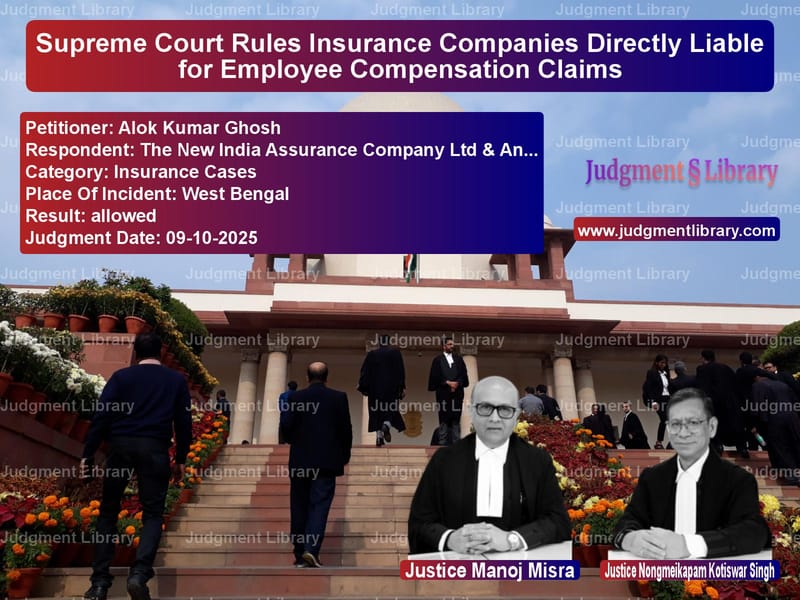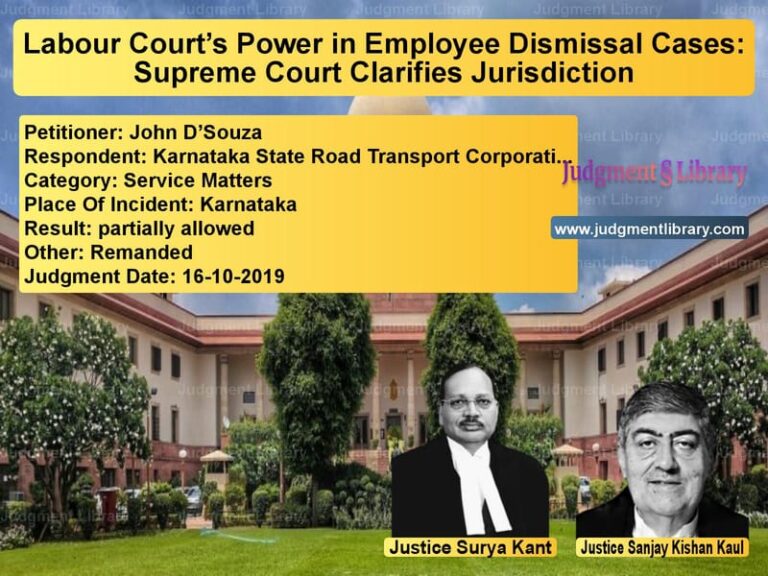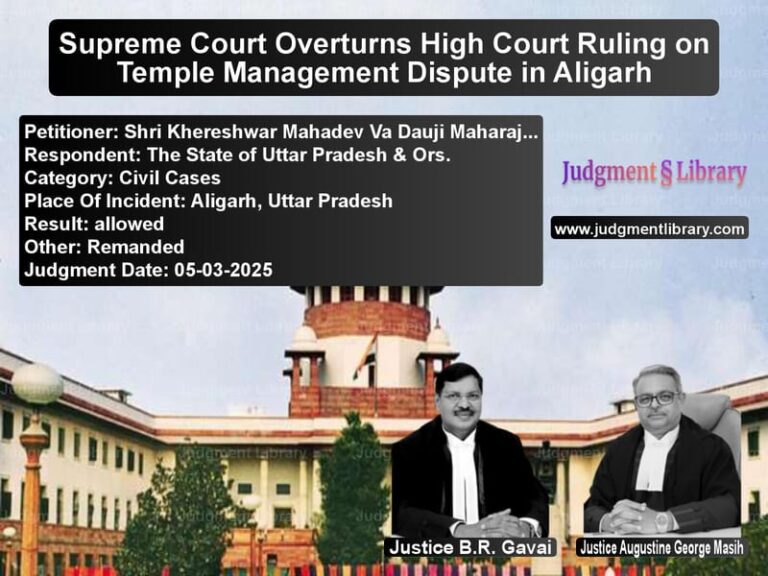Supreme Court Rules Insurance Companies Directly Liable for Employee Compensation Claims
In a significant judgment that strengthens the rights of injured workers, the Supreme Court has delivered a landmark ruling making insurance companies directly liable for compensation claims under the Employees’ Compensation Act. The case involved Alok Kumar Ghosh, an employer, and New India Assurance Company, and centered around a fundamental question: when a worker gets injured on the job, can they claim compensation directly from the insurance company, or must they go through the employer first?
The dispute began when a driver employed by Alok Kumar Ghosh suffered a disabling injury during the course of his employment. The worker filed a compensation claim under the Workmen’s Compensation Act, 1923 (now known as the Employee’s Compensation Act, 1923) against both his employer and the insurance company. The Commissioner for Workmen’s Compensation awarded Rs. 2,58,336 with 12% interest, holding both the employer and insurance company jointly liable. However, the insurance company appealed to the Calcutta High Court, arguing that under the law, only the employer should be held primarily liable, and the insurance company’s role was merely to reimburse the employer later.
The Legal Battle
The High Court accepted the insurance company’s technical argument and modified the Commissioner’s order. The court directed that the employer should pay the compensation first and then seek reimbursement from the insurance company. This decision meant that the injured worker would have to depend on his employer’s financial capacity to receive compensation, rather than being able to claim directly from the well-funded insurance company.
Aggrieved by this decision, the employer approached the Supreme Court. The appellant’s counsel argued that ‘there is no dispute regarding the claim being covered by the contract of insurance. Further, there is no dispute regarding appellant’s right of reimbursement; and there is no challenge to the amount of compensation awarded. In such circumstances, there was absolutely no justification for the High Court to modify the award in the aforesaid terms.’
The appellant also pointed to the Supreme Court’s earlier decision in Mahendra Rai vs. United India Insurance Company Ltd., where a similar plea by an insurance company had been rejected.
The Insurance Company’s Defense
The New India Assurance Company, represented by their counsel, defended the High Court’s decision with several legal arguments. They contended that ‘the 1923 Act imposes liability on the employer; and there is no provision therein for compulsory insurance or fastening liability on the insurer to satisfy judgment and awards against persons insured, as is there in Section 149 of Motor Vehicles Act, 1988. Hence, rights of insured and insurer are governed by the contract of insurance, which is to indemnify the insured, and therefore, the claimant would have no right to directly claim compensation from the insurer.’
The insurance company cited several Supreme Court decisions including New India Assurance Co. Ltd. v. Harshadbhai Amrutbhai Modhiya & Anr., P. J. Narayan v. Union of India, and Gottumukkala Appala Narasimha Raju and others v. National Insurance Co. Ltd. to support their position. They even went so far as to argue that the Mahendra Rai decision was ‘per incuriam’ (passed in ignorance of relevant law) because it overlooked the statutory scheme of the 1923 Act.
The Supreme Court’s Analysis
The Supreme Court, comprising Justices Manoj Misra and Nongmeikapam Kotiswar Singh, conducted a thorough examination of the legal provisions and previous judgments. The Court identified the core issue as: ‘Whether in a proceeding initiated under the 1923 Act for compensation payable under the said Act, insurer could be made a party respondent? If yes, whether compensation can be awarded against it if otherwise admissible under the contract of insurance?’
The Court found that this issue was already settled in Gottumukkala Appala Narasimha Raju’s case, where it was held that ‘there does not exist any bar in the 1923 Act in this behalf. Section 19 of the 1923 Act specifically provides that any question in regard to the liability of a person who is required to indemnify the employer must be determined in the proceeding under the said Act and not by way of a separate suit. Thus, a question of this nature should be gone into the proceeding under the 1923 Act.’
The Court emphasized the social welfare nature of the Employees’ Compensation Act, stating that ‘the object of the Act is not merely to provide compensation but also to provide a speedy and efficacious remedy to a workman/ employee, or his or her dependent, to realize compensation for injury, or death, suffered by accident arising out of and in the course of his or her employment.’
The judges made a crucial observation about the practical implications of the insurance company’s argument: ‘No doubt, Section 3 of the 1923 Act fixes liability to pay compensation on an employer but where the liability of an employer is covered by a contract of insurance, exclusion of the insurer from being jointly and severally liable for payment of the compensation awarded would have deleterious effect on the very purpose which the legislation seeks to achieve and would render the remedy illusory. This we say so, because if we hold that the insurer would be liable only to reimburse the employer, in the event employer fails to make payment for any reason whatsoever, including financial incapacity, question of reimbursement would not arise and the workman /employee, for whose benefit legislation has been made, would be left high and dry.’
The Court also referenced its earlier decision in Mahendra Rai’s case, where it had rejected similar arguments from an insurance company, observing that ‘the learned Counsel for the Insurance Company submitted that the Commissioner has no jurisdiction under the Act to direct the Insurance Company to pay the compensation; it is the owner who is liable to pay. However, such submission cannot be accepted in view of the fact that the vehicle is insured with the insurance company.’
Rebuttal of Insurance Company’s Precedents
The Supreme Court carefully examined the cases cited by the insurance company and found them distinguishable. Regarding Harshadbhai Amruthhai Modhiya’s case, the Court noted that it dealt with whether interest is payable by an insurer while indemnifying the insured, and that in the present case, ‘there is no dispute that the insurer has undertaken the liability to indemnify the insured (i.e., the employer) and has not contracted out of his liability. In such circumstances, in our view, the aforesaid decision is of no help to the first respondent.’
Similarly, regarding P.J. Narayan’s case, the Court observed that it involved a different issue about insurance companies excluding liability to pay interest through policy clauses, and since ‘the first respondent has not even brought the insurance policy on record’ in the present case, that precedent was also not applicable.
The Final Ruling and Costs
The Supreme Court allowed the appeal and restored the Commissioner’s original award that made the insurance company directly liable. The Court directed that ‘the amount deposited by the insurance company shall be released in favour of the workman (the second respondent) in terms of the award passed by the Commissioner. If the amount so deposited has earned interest, the interest accrued thereon shall also be released in favour of the second respondent along with the principal within a period of one month.’
In a significant move, the Court also imposed costs of Rs. 50,000 on the insurance company for unnecessarily filing appeals on technical grounds. The judges expressed their ‘anguish at the practice of Insurance Companies unnecessarily filing appeals by raising technical pleas more so when they do not deny their ultimate liability under the contract of insurance.’
The Court criticized both the insurance company and the High Court, noting that ‘the High Court also adopted a hyper technical approach and overlooked the provisions of Section 19 of the 1923 Act while modifying the award passed by the Commissioner to the disadvantage of the employee (i.e., the claimant) when there was no dispute regarding the liability of the insurance company under the contract of insurance.’
Broader Implications
This judgment has far-reaching implications for workers’ compensation claims across India. By affirming that insurance companies can be made directly liable and joined as necessary parties in compensation proceedings, the Supreme Court has ensured that injured workers don’t get caught in procedural technicalities that delay or deny their rightful compensation.
The ruling reinforces the social welfare character of labor legislation and sends a clear message to insurance companies against using technical defenses to avoid their responsibilities. The imposition of costs also sets a precedent that courts will not tolerate unnecessary litigation that delays justice to genuine claimants.
Most importantly, the judgment recognizes the practical reality that many employers may not have the immediate financial capacity to pay compensation, and making workers depend solely on employers would defeat the very purpose of having insurance coverage. By allowing direct claims against insurers, the Court has ensured that the protective umbrella of insurance actually protects the workers it’s intended for.
This decision aligns with the progressive interpretation of labor laws that prioritize substance over form and ensure that technical legal arguments don’t undermine the social justice objectives of welfare legislation. It represents another step in the ongoing judicial effort to make compensation mechanisms more accessible and effective for India’s workforce.
Petitioner Name: Alok Kumar Ghosh.Respondent Name: The New India Assurance Company Ltd & Anr..Judgment By: Justice Manoj Misra, Justice Nongmeikapam Kotiswar Singh.Place Of Incident: West Bengal.Judgment Date: 09-10-2025.Result: allowed.
Don’t miss out on the full details! Download the complete judgment in PDF format below and gain valuable insights instantly!
Download Judgment: alok-kumar-ghosh-vs-the-new-india-assura-supreme-court-of-india-judgment-dated-09-10-2025.pdf
Directly Download Judgment: Directly download this Judgment
See all petitions in Motor Insurance Settlements
See all petitions in Health Insurance Disputes
See all petitions in Commercial Insurance Disputes
See all petitions in Insurance Settlements
See all petitions in Third-Party Insurance
See all petitions in Judgment by Manoj Misra
See all petitions in Judgment by N. Kotiswar Singh
See all petitions in allowed
See all petitions in supreme court of India judgments October 2025
See all petitions in 2025 judgments
See all posts in Insurance Cases Category
See all allowed petitions in Insurance Cases Category
See all Dismissed petitions in Insurance Cases Category
See all partially allowed petitions in Insurance Cases Category







